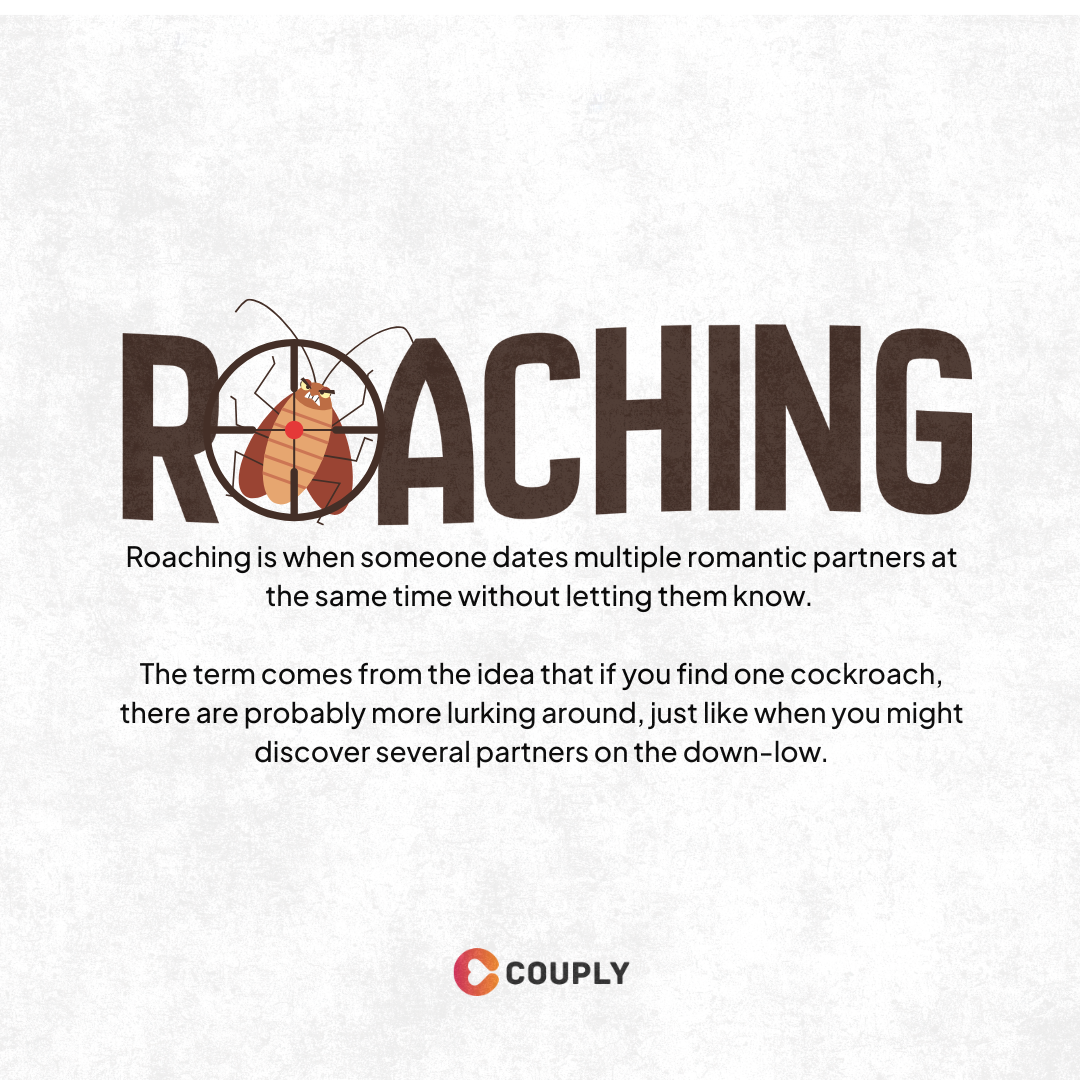You’ve probably heard of ghosting. You might even know about breadcrumbing. But have you heard of roaching? It’s the latest toxic dating trend crawling out of the shadows, and the name is as unsettling as the behavior it describes.
Roaching happens when someone hides the fact they’re seeing multiple people at once, all while letting you believe you’re in an exclusive relationship—or at least a casual but honest one. Like the cockroach metaphor it’s named after, once you discover one lie, you can bet there are more lurking in the dark.
This isn’t about consensual non-monogamy or open relationships where honesty is the rule. Roaching thrives on secrecy, manipulation, and keeping you in the dark. And it’s leaving a trail of confusion, betrayal, and heartbreak.
So let’s pull the lights on. Here’s everything you need to know about roaching: what it is, why people do it, how to spot the red flags, and how to protect yourself from being played.
What Is Roaching, Really?

At first glance, roaching might sound like just another modern dating buzzword. But unlike ghosting or breadcrumbing, this one hits at the very foundation of trust in relationships.
Roaching is deception disguised as casual dating.
It happens when someone deliberately hides the fact that they’re seeing multiple people, while allowing—or even encouraging—you to believe the two of you are exclusive. They don’t tell you you’re one of many. They let you think you’re the only one, or at least the main one. That silence is the lie.
The term comes from the classic saying: “If you see one cockroach, there are probably more hiding in the dark.” It captures the ugly truth: once you catch a hint of secrecy, chances are there’s a whole lot more you don’t know.
Here’s how roaching shows up in practice:
- You’ve been seeing someone for weeks, maybe months. The vibe feels committed, but you’ve never had “the talk.” Then you find out—through a mutual friend, a suspicious social media tag, or a casual slip—that they’ve been dating other people the entire time.
- They never clarify the relationship status, but their actions (exclusive sleepovers, introducing you to their family, talking about future plans) make you believe you’re the only one.
- When you finally confront them, they might shrug it off with: “I never said we were exclusive.” Which is technically true—but completely manipulative when they’ve been acting otherwise.
What makes roaching different from open or poly relationships?
- In ethical non-monogamy, everyone knows the setup and agrees to it. Honesty is baked into the dynamic.
- In roaching, dishonesty is the foundation. You’re kept in the dark, so you can’t make informed choices about your emotions, your safety, or your future.
The most insidious part? Roaching doesn’t always look dramatic. It’s not necessarily someone sneaking around with a double life. Sometimes it’s as subtle as omission. They never tell you there are others. They let you assume. And assumption, in this case, is exactly what they’re banking on.
Roaching is lying by silence. It’s creating the illusion of exclusivity while hiding a lineup of other connections in the background. And once you discover it, the betrayal cuts deep—because it wasn’t just about sex or dating multiple people. It was about stripping away your right to know the truth.
Why People Roach
So why do people do this? Why not just be upfront about wanting to see multiple people? The reasons vary, but a few patterns stand out.
1. Fear of Commitment
Some people panic at the idea of exclusivity. Instead of admitting it, they hide behind lies. Roaching lets them enjoy the benefits of intimacy without the responsibility of commitment.
2. Keeping Options Open
Dating apps have turned modern romance into a buffet. Some people don’t want to choose just one dish, so they hide the fact they’re sampling everything at once.
3. Avoiding Hard Conversations
Saying “I’m not looking for exclusivity” requires honesty and vulnerability. For a roacher, it’s easier to dodge the talk and let you assume.
4. Ego Boost
Having multiple people interested at once can inflate someone’s ego. Roaching isn’t about building meaningful connection—it’s about validation and attention.
5. Insecurity and Fear of Loss
Some roachers believe if they’re honest, they’ll lose you. Ironically, the secrecy almost always guarantees exactly that.
Signs You’re Being Roached
The worst part of roaching? It’s often subtle. You might not find obvious evidence. Instead, you feel a creeping sense that something’s off. Here are the red flags:
1. They Avoid Exclusivity Talks
- They dodge questions about where things are headed.
- “Let’s not label this” becomes their favorite phrase.
- Anytime the future comes up, they change the subject or brush it off.
2. They’re Secretive About Their Life
- Their phone is always face down.
- They get cagey about weekend plans.
- They rarely introduce you to friends or family.
It’s not privacy—it’s secrecy.
3. Their Availability Is Inconsistent
- One week they’re all over you, the next they’re “busy.”
- Plans get canceled last minute.
- Excuses feel vague or recycled.
4. You Never Get Below Surface-Level
- Conversations stay light, never deep.
- They don’t share personal stories or open up emotionally.
- Talking about “us” feels impossible.
5. Their Social Media Doesn’t Match Reality
- No photos of you, no tags, no mention of your existence.
- Meanwhile, you notice questionable activity—new follows, flirty comments, suspicious tags from others.
6. You Feel Like an Afterthought
- You’re always the one initiating.
- They text late at night but disappear during the day.
- You’re good for convenience, not priority.
7. Your Gut Is Screaming
Sometimes you don’t need proof. You just feel it. That subtle discomfort, that little voice saying, Something isn’t right here. That’s your intuition—don’t ignore it.
Why Roaching Is So Damaging
Being roached doesn’t just sting in the moment. It leaves deeper marks that can last long after the relationship ends.
1. It Breaks Trust
You thought you were building something real, only to discover layers of deceit. That betrayal makes it harder to trust the next person.
2. It Undermines Self-Esteem
Victims of roaching often blame themselves: Was I not enough? Did I miss the signs? The problem isn’t you—it’s the dishonesty of the roacher.
3. It Creates Emotional Exhaustion
Trying to decode mixed signals, questioning every excuse, and second-guessing yourself drains your mental energy. It’s a constant rollercoaster of hope and doubt.
4. It Risks Your Health
When sexual activity is involved, hiding multiple partners can carry real physical risks. Without honesty, you can’t make informed choices about your safety.
5. It Wastes Time
While you’re investing energy into what you think is a relationship, they’re scattering theirs everywhere. Months—or years—can be lost in the fog of lies.
How to Respond If You Suspect Roaching
If you feel like something’s off, don’t sit in silence. Here’s how to take back control.
1. Get Clear on What You Want
Decide your expectations. Do you want exclusivity? Do you want honesty, even if they’re dating others? Knowing your boundaries is the first step.
2. Ask Direct Questions
Instead of tiptoeing, ask plainly:
- “Are you seeing other people right now?”
- “Do you see this as exclusive, or casual?”
The way they answer—and whether their actions match—will tell you everything you need to know.
3. Watch Actions Over Words
Anyone can say, I’m only seeing you. But if they dodge plans, stay secretive, or act inconsistently, believe the behavior, not the promises.
4. Set Boundaries
Decide what’s unacceptable to you. If secrecy and avoidance are the norm, that’s a boundary being crossed.
5. Be Ready to Walk Away
If they can’t be transparent, don’t waste more energy. Leaving isn’t losing—it’s choosing your dignity over deception.
How to Protect Yourself From Roaching
You can’t control someone else’s honesty, but you can protect yourself from getting blindsided.
1. Clarify Expectations Early
Don’t wait months to ask where things are going. Early conversations about exclusivity may feel awkward, but they save you from being misled.
2. Trust Red Flags, Not Excuses
When their behavior doesn’t add up, listen to the inconsistency. Don’t let charm or chemistry blind you.
3. Keep Your Independence
Maintain friendships, hobbies, and routines outside the relationship. The more grounded you are in yourself, the less likely you’ll tolerate shady treatment.
4. Prioritize Honesty as a Standard
If someone can’t have an honest conversation about what they want, they don’t deserve your time.
5. Stay Safe
If there’s sexual activity involved, always protect yourself. Assume nothing—transparency about partners is a non-negotiable part of consent.
The Bigger Picture: Why Roaching Keeps Spreading
Roaching isn’t just about one shady person sneaking around. It’s a symptom of modern dating culture. The way we meet, connect, and commit has shifted so dramatically in the last decade that behaviors like roaching are almost inevitable.
Here’s why this toxic trend keeps crawling out of the shadows:
1. Dating Apps Have Turned Love Into a Marketplace
With endless swipes and an ocean of profiles, people are conditioned to keep their options open. Why settle down when the next match could be “better”? That constant influx of new possibilities makes exclusivity feel optional—and roaching thrives in that gray area between casual dating and commitment.
2. Hookup Culture Normalizes Casual, But Not Honesty
Casual dating isn’t the problem. The problem is that casual often gets conflated with “no responsibility.” Many people think if it’s not serious, they don’t owe anyone the truth. That mindset creates the perfect cover for roaching—where secrecy is justified under the banner of “we’re just having fun.”
3. Fear of Vulnerability
Talking about exclusivity requires guts. It means admitting what you want, risking rejection, and showing your cards. Instead of doing that, roachers choose avoidance. They hide behind vagueness and secrecy, telling themselves silence is safer than honesty.
4. The Illusion of “Technical Innocence”
Many roachers defend their behavior with lines like, “I never said we were exclusive.” And technically, they’re right. But emotional deception doesn’t require outright lies. It’s about creating false impressions. Roaching spreads because people convince themselves they’re not really doing anything wrong.
5. Social Media Makes Secrecy Easier
It’s easy to curate multiple realities online. You can DM several people, maintain separate “close friends” lists, and keep certain photos hidden. Social media provides endless ways to compartmentalize relationships—and endless ways to get caught.
6. Instant Gratification Over Long-Term Connection
Modern dating often prioritizes novelty over depth. The dopamine rush of new attention feels more exciting than the steady comfort of exclusivity. Roaching feeds that craving, letting someone juggle multiple “new relationship energy” highs without ever committing.
7. Breakdown of Clear Relationship Scripts
In the past, dating followed clearer steps: meet, court, commit, define. Now, the stages are blurry. Is “talking” dating? Does exclusivity happen after three dates? Six weeks? Without universal rules, people fill in the blanks themselves. That ambiguity is fertile ground for roaching.
Why This Matters
Roaching isn’t just an individual betrayal—it’s a cultural problem. When honesty takes a back seat to convenience, people start to normalize deception. And the more common it becomes, the harder it is for daters to trust one another.
But here’s the truth: secrecy isn’t harmless. Even if someone defends it as “casual,” roaching strips others of their right to make informed choices about their time, energy, and health. It corrodes the very foundation of trust in dating.
Roaching spreads because modern dating gives it cover—too many options, too much ambiguity, and not enough honesty. If we want healthier relationships, the cure isn’t fewer options. It’s clearer communication, firmer boundaries, and a refusal to let secrecy pass as “just how dating works now.”
Would you like me to now expand the “How to Protect Yourself From Roaching” section into a full practical guide with scripts, boundaries, and real-life scenarios so readers walk away with concrete tools?
Roaching thrives in the dark. It counts on secrecy, silence, and your willingness to doubt yourself. But once you flip on the light—ask the hard questions, trust your instincts, and demand honesty—it can’t survive.
Here’s the truth: you deserve transparency. You deserve someone who respects you enough to be upfront, even if the answer isn’t what you hoped.
Because real love doesn’t skitter when the lights come on. It doesn’t hide. And it never makes you feel like one of many when you’re supposed to be the only one.








